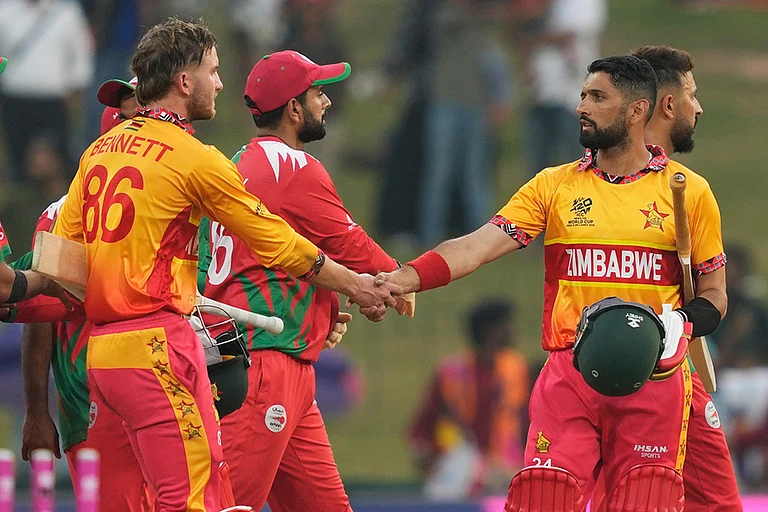ON September 24, Laloo Prasad Yadav carried out a mock exorcising of his three ghosts, Vajpayee, Advani and George, in Patna. At a place which is better known for protestors putting up tents, he got one of his deputies to do the invocation. There was much mirth and merriment and a good time was had by all. Twentyfour hours later, it turned out that the invocation had borne fruit.
The sting lay in the tail. And it came as a bit of an anti-climax at the end of a hectic week. In a weighty communique addressed to the Union government, president K.R. Narayanan turned down the Union cabinet's proposal to dismiss the Bihar government and place the assembly under "suspended animation", reportedly citing the fact that the Rabri government had just won a post-walkout 190-0 trust vote in the 321-strong state assembly and thus invalidated a case of constitutional breakdown. The communique quoted legal precedents to indicate the loopholes in the dismissal proposal.
ADVANI SAYS THE CABINET MAY STILL FIND GROUNDS FOR SACKING RABRI DEVI
That the move had put the government in a twist was clear from home minister L.K. Advani's statement that a response could be formulated only after prime minister Atal Behari Vajpayee returned from his New York-Paris visits. Advani, however, also indicated that if the cabinet found enough grounds to recommend a dismissal—after going through it all over again—it would send it right back to the president. To Laloo, also under pressure on the fodder scam front, the decision could not have come at a better time. "Democracy has been vindicated. It is a just decision," he gloated.
Master politician, Laloo whipped into action three weeks ago ever since he got wind of the dismissal moves. First, he picked on the sticky Vananchal issue, dramatically announced his opposition to "breaking up" Bihar; asked his chief minister wife to seek a vote on it and won an overwhelming 181-106 support in the assembly. "The BJP action will prove to be too hasty," he had warned. The prediction came true.
Clearly, governor Sunder Singh Bhandari appears to have overplayed his cards. After his first-hand experience, Bhandari was in little doubt that Bihar's salvation lay in president's rule. So, when he dashed to Delhi last fortnight to meet prime minister Vajpayee and Advani to "apprise" them of the ground situation, political observers already knew the script. Bhandari had done his homework and came armed with a long list of reasons why the Rabri Devi government should be urgently dismissed: the law and order situation, he said, was precarious; salaries were not being paid; there was a parallel extremist administration running in at least seven districts; the ISI had made deep inroads in the border districts; and the state had reached a state of total bankruptcy.
But Laloo had been studying his rivals well. He indicated that the move had been forced on the BJP by Bhandari who in turn was influenced by the Samata ministers in the coalition—George Fernandes and Nitish Kumar—both literally coaxed the prime minister to meet the president. "It is an unprecedented act for two ministers to carry the prime minister to Rashtrapati Bhavan," Laloo said.
According to well-placed BJP sources, Bhandari's decision was egged on by a four-month-long battle of attrition with the Rabri Devi government over appointments to universities. Several appointments had been held up by the governor, citing procedural lapses, and the situation was coming to a head. So, when the news came that the Union cabinet had recommended its dismissal, it did not catch the Rashtriya Janata Dal (RJD) by surprise either.
LALOO, who had dared the Centre to dismiss his (wife Rabri's) government, bellowed: "It is an RSS gameplan and I shall thwart it." The Opposition, otherwise largely fragmented over the issue of Congress participation in an alternative government, has suddenly come alive. The Congress, Mulayam Singh Yadav, the Left parties and even the Janata Dal—save arch Laloo-baiter Ram Vilas Paswan—are speaking in one voice. The use of Article 356, they chime, is undemocratic and reveal the hidden agenda of the BJP.
Senior BJP leaders admit that for months now, they have been under intense pressure from their cadres and the Samata Party to dismiss the Bihar government. Taking a calculated gamble, the BJP recommended Central rule, which is technically binding on the president, even if he has returned it once. Says a BJP leader: "Now whatever happens, we can tell our people that at least we tried."
Well-placed BJP sources say the BJP government, and Fernandes and Nitish Kumar reportedly favour elections in Bihar around the same time the other states go to polls.
Laloo, of course, wasted no time. He summoned all his RJD MLAs to Patna amid speculation that they were being wooed by rivals. Then, he held a press conference to say his government was not going. Wife Rabri Devi threatened to go on a fast-unto-death and senior RJD leaders sat on an impromptu dharna opposite Raj Bhavan, where the choicest epithets were reserved for Bhandari and Co.
But the rub came the next day, when the RJD-sponsored state bandh passed off rather peacefully—barring a killing in Bhagalpur, and the ransacking of some railway property elsewhere, there was nothing to write home about. "Where is the violence that the BJP has been harping on?" retorted RJD minister Vijay Krishna. "Lalooji is not an individual. He is an institution. And this is a blatant attempt to damage the institution."
Naturally, not everyone looked at it like that. For some, it meant that Laloo, a truly formidable leader who has individual charisma and a loose but aggressive cadre base, was being put in the dock. Germane to the entire issue is the governor's scathing report. Even while the BJP toned down the report from 'dissolving the assembly' to 'suspended animation', the impact would be the same.
According to sources, the toned-down report came at the insistence of attorney-general Soli Sorabjee who insisted that such a move would invite the court's intervention. Says senior lawyer Rajeev Dhavan: "In recommending suspended animation, they have paid lip-service to the Bommai judgement." According to Bhandari's report, between 1990 and 1997, which was Laloo's two terms, more than 51,000 people have been killed; more than 7,000 women were raped; there were close to 24,000 dacoities and more than 17,000 kidnappings. And these were the registered cases.
Bhandari's report also mentions the spurt in political killings—"the numbers have touched the 425 mark"—many of them RJD rivals. Kidnapping has become an industry. Criminal gangs have carved out their respective spheres of influences.
The governor's report is said to have quoted a letter by the chief secretary of Bihar who earlier this year wrote to the Centre, saying that as many as 29 districts were "seriously disturbed" on account of extremist and Naxal-related violence. In some districts like Chatra, Jehanabad, Giridih, Hazaribagh, Aurangabad and Palamu, government authority had eroded with extremists issuing orders, cornering all development funds with little or no opposition from officials. The police force, the report points out, has become an appendage of the ruling party; and the state is being administered by a council of ministers, many of whom have criminal connections.
Bihar shares a long border with Nepal and the increasing influence of Pakistan's ISI is quite visible. Bhandari's report quotes the general officer commanding of central command, Lt. Gen. Surjit Singh Bangra, admitting before a civil-military liaison in Patna that the ISI had made deep inroads and is a key conduit of arms and narcotics into the country. State intelligence agencies have time and again warned the state government of the impending threat of the ISI.
In such a situation, governance is tough. Says Omprakash Sinha, general secretary of the labour enforcement officer association of Bihar: "We have not got salaries for six months. Ironically, it is our job to ensure that companies pay salaries to their employees. What authority do we have if we ourselves are not paid?" Government employees working in corporations say the situation is so bad that there is no stationery in offices: often office orders and circulars cannot be issued due to lack of office equipment; even routine promotions have been held up for years.
Says Sushil Modi of the BJP: "We have opposed Article 356. But in Bihar's case, it fits like a glove." Only, Laloo doesn't think so and on September 25, once the president sent back the proposal to dismiss Rabri Devi, he had won round one of the battle for Bihar.


























